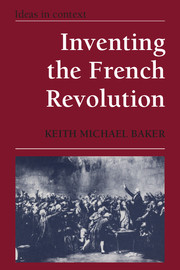Book contents
- Frontmatter
- Contents
- Acknowledgments
- Introduction
- 1 On the problem of the ideological origins of the French Revolution
- Part I French history at issue
- Part II The language of politics at the end of the Old Regime
- 5 French political thought at the accession of Louis XVI
- 6 A classical republican in eighteenth-century Bordeaux: Guillaume-Joseph Saige
- 7 Science and politics at the end of the Old Regime
- 8 Public opinion as political invention
- Part III Toward a revolutionary lexicon
- Notes
- Index
5 - French political thought at the accession of Louis XVI
Published online by Cambridge University Press: 05 June 2012
- Frontmatter
- Contents
- Acknowledgments
- Introduction
- 1 On the problem of the ideological origins of the French Revolution
- Part I French history at issue
- Part II The language of politics at the end of the Old Regime
- 5 French political thought at the accession of Louis XVI
- 6 A classical republican in eighteenth-century Bordeaux: Guillaume-Joseph Saige
- 7 Science and politics at the end of the Old Regime
- 8 Public opinion as political invention
- Part III Toward a revolutionary lexicon
- Notes
- Index
Summary
The last coronation of the Old Regime, which took place at Rheims on 11 June 1775, was by all accounts a lavish, costly, and touching affair. The magnificence of the coronation regalia, which drew crowds when exhibited in Paris in the weeks preceding the ceremony, was matched by the ostentatiousness of the festivities in the city of Rheims itself and by the emotional exuberance of the moment when, at the culmination of the coronation service, the great doors of the cathedral were opened and the populace was admitted to hail its king. “At that moment, spontaneous tears of joy ran down every cheek,” the due de Croÿ recorded in his diary.
I am sure that I have never experienced such enthusiasm; I was completely astonished to find myself in tears and to see everyone else in the same condition. The queen was so seized with pleasure that her eyes streamed in torrents; she was obliged to draw her handkerchief, and this increased the general emotion. The king appeared really touched by this beautiful moment, and we saw, finally, something that can only be seen here: our king, clothed in all the radiance of royalty, on the true throne, a vision so powerful that it cannot be expressed. The emotional rapture was really general.
Whatever the strength of this emotional tidal wave, however, it did not entirely erase other currents of concern.
- Type
- Chapter
- Information
- Inventing the French RevolutionEssays on French Political Culture in the Eighteenth Century, pp. 109 - 127Publisher: Cambridge University PressPrint publication year: 1990
- 2
- Cited by

